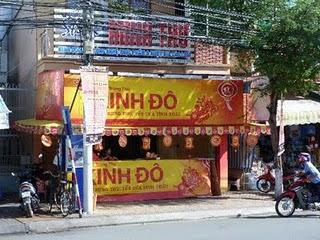
In ein paar Wochen ist es wieder so weit, das Mitt-Herbst-Fest findet statt. Die Straßenzüge in Can Tho füllen sich jetzt bereits mit Ständen, wo man die Mondkuchen dafür kaufen kann. Die Dinger sind wirklich teuer und kommen in zwei Variationen daher: einmal mit Ei gefüllt und einmal mit Zitronat etc.
Warum dieses Fest im lunaren Mittherbst stattfindet, ist natürlich spekulativ beantwortbar. Dass es aus China stammt, ist natürlich klar. Eine Legende berichtet, dass der Himmlische Hirte (Ngưu Lang) und die Weberin (Chức Nứ) dá ganze Jahr über getrennt sind - nur während dieses einen Tages im Mitt-Herbst können sie zusammenkommen. Die Legende kommt aus China und ist besonders in Japan sehr beliebt, wo ihr zu Ehren das Tanabata-Fest existiert.
In Vietnam wird dieses Fest noch mit dem Mond zusammengeführt. Historiker verweisen darauf, dass in diesem Monat der Mond besonders klar ist. Angeblich sei in den letzten 1000 Jahren nur ein Dutzend Mal der Mond wegen Regens nicht zu sehen gewesen. Darüber hinaus ist dies die Hochzeit der grünen Reis-Saison, sprich der fruchtbaren Zeit. Das Mitt-Herbst-Fest ist demzufolge ein altes Fruchtbarkeits- bzw. Dankesfest, wie wir es im Westen in dieser Zeit ja auch feiern (Erntedankfest).
========
In some weeks the Mid-Autumn Festival will be held. The streets in Can Tho are filling with sales stalls for the moon cakes. The cakes are really expensive and there are two varieties: One filled with egg, one with candied lemon etc.
Why this festival is held is highly speculative to answer. It derives surely from China. One legend says there is the herding boy (Ngưu Lang) and his love, the Heavenly Weaving girl (Chức Nứ). They only can meet on one day in the year. This legend comes from China but is most popular in Japan, where it is called Tanabata and a festival is held for it.
In Vietnam this festival is connected with the moon. Historians explain that the moon in this lunar month is brightlier than in other months. Allegedly the moon can be seen better than in other months and in the last 1000 years only in a dozen times the moon was not to see due to bad weather. The Mid-Autumn Festival further falls in the high season of the green rice. Therefore, this festival is an old fertility festival or harvest festival like our western festivals (Erntedank).


